Republic of Mastar
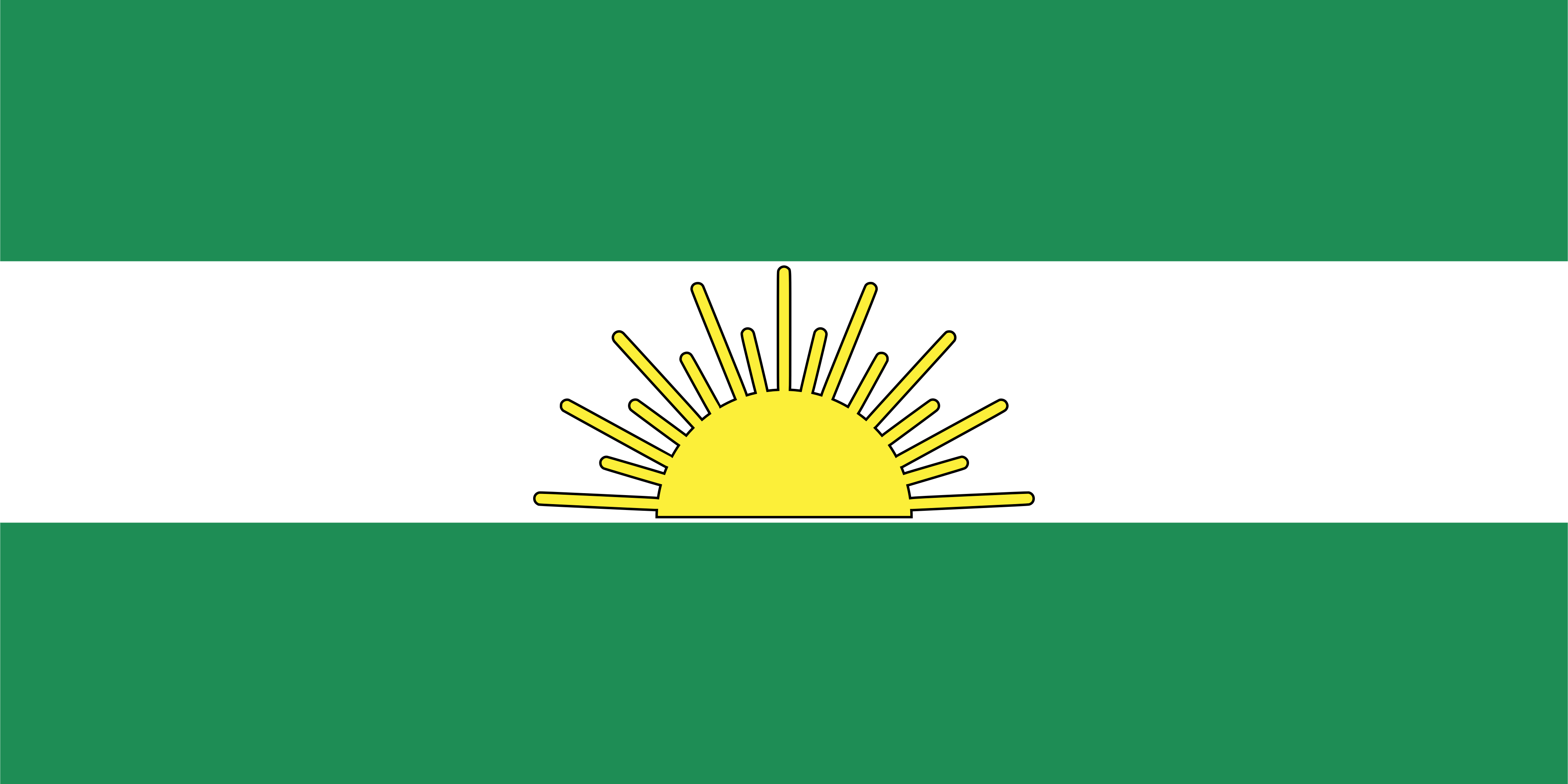
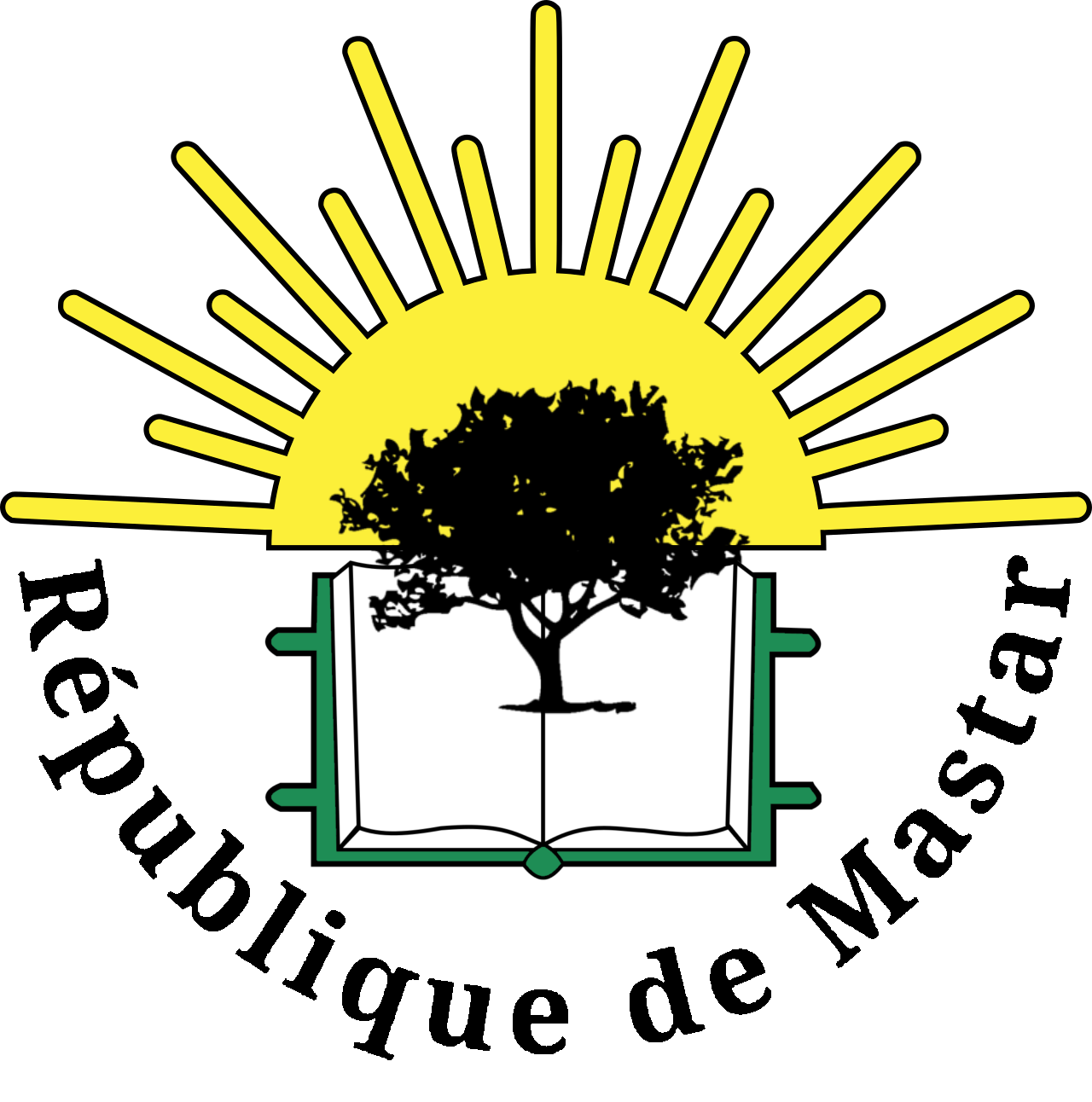
| Capital: | Qadam |
| Official language: | Renish |
| Ethnic groups: | Waraniyan (71%) Renish (19%) Other (9%) |
| Religions: | Shafar (52%) Messianity (19%) Karaism (12%) Hasdi (10%) Other (2%) No religion (5%) |
| Population: | 5 Million |
| Government: | Unitary Semi- -Presidential Republic |
| President: | Eloise Haddad |
| Prime Minister: | Alain Alami |
| GDP: | $29 Billion (1990) |
| Currency: | Mastari Denier |
Mastar (République de Mastar) is a country located in South-West Aurora inhabitated by around 5 million people (1990). Mastar's capital is Qadam and the country is divided into 10 departments which make up the country. Mastari economy is mainly dominated by tourism and mining.
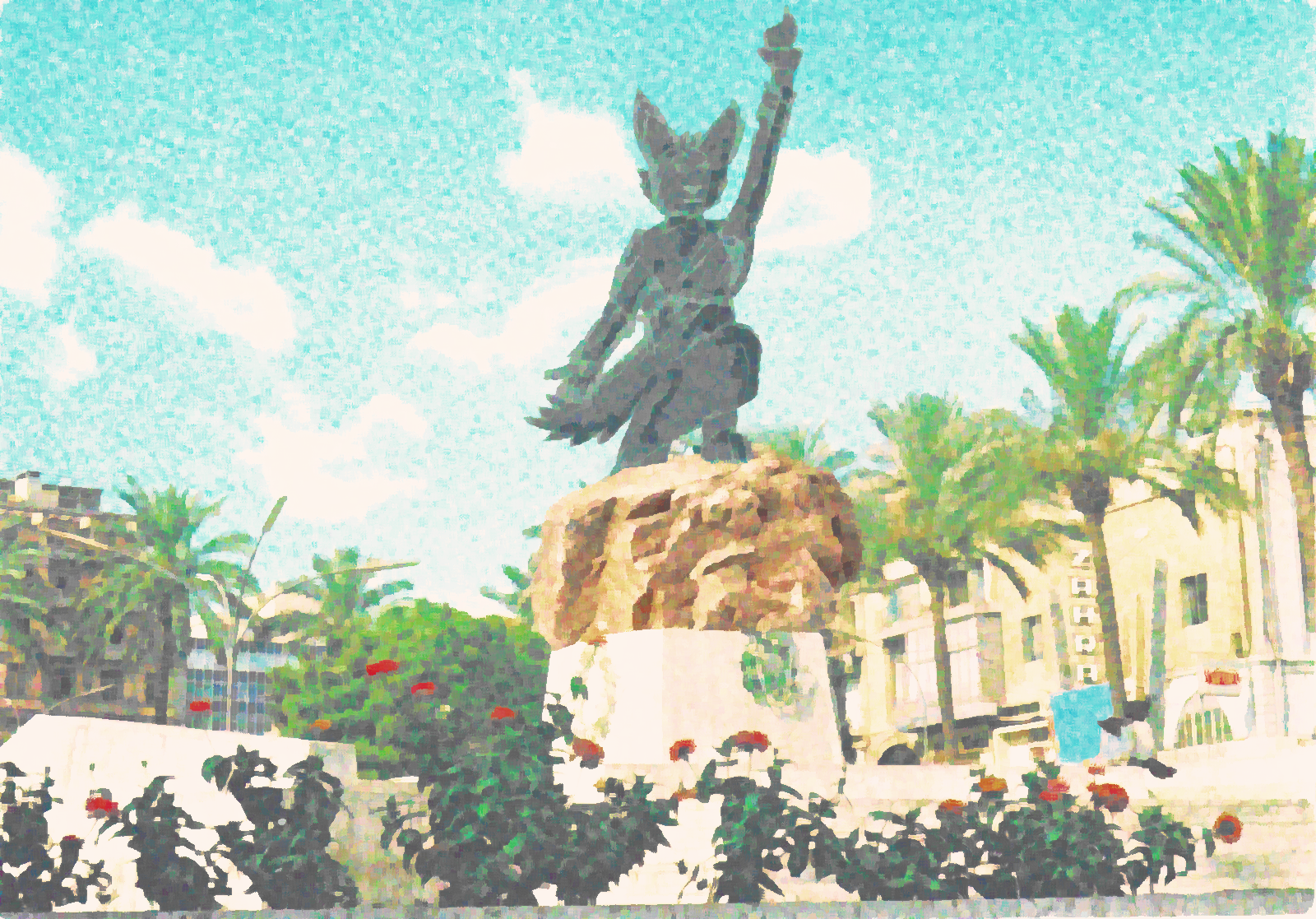 Qadam (1980)
Qadam (1980)
History
Prehistory
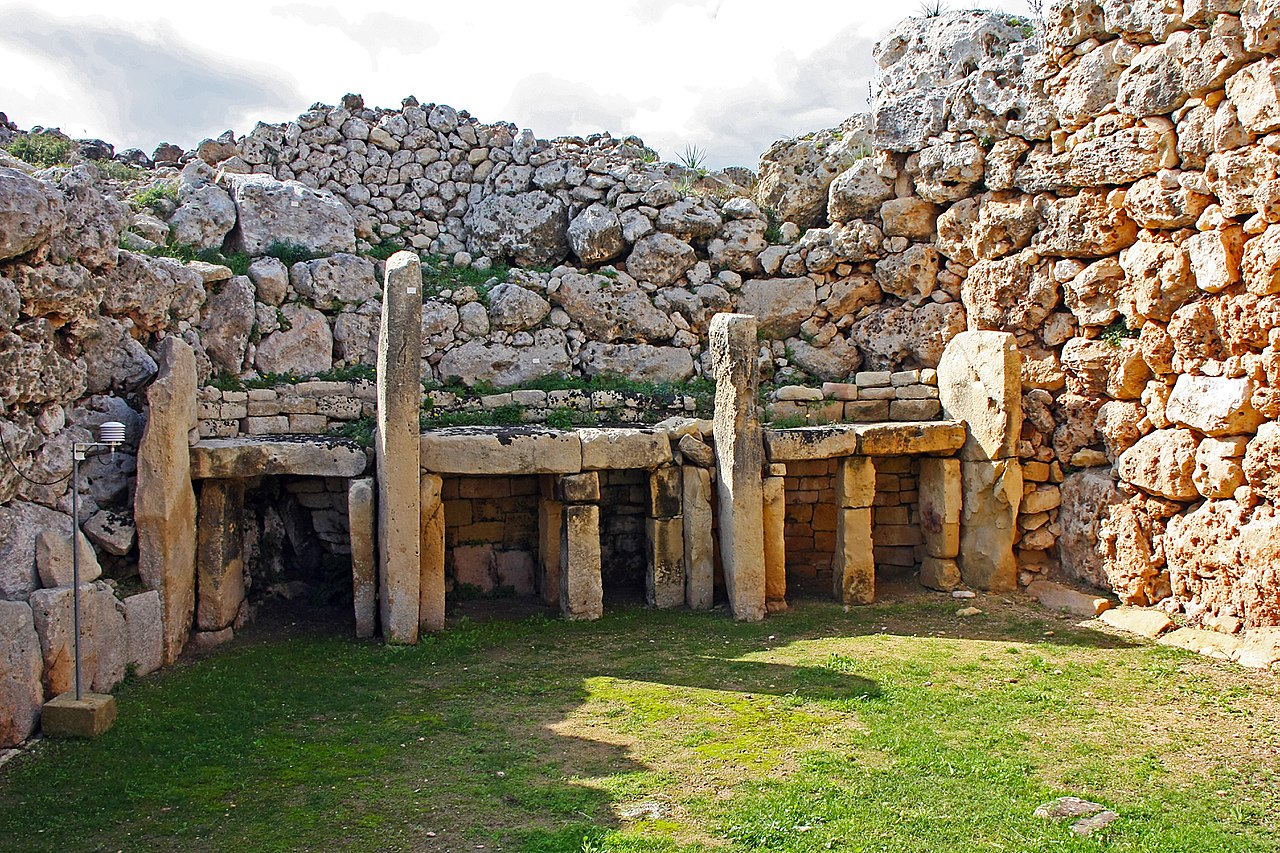 Fartar Stone Temple (Circa 5,000 BOE)
Fartar Stone Temple (Circa 5,000 BOE)
The earliest canine activity in the territory of Mastar can be dated as far back as 50,000 years Before Our Era (BOE). The earliest organized culture, called the Martidique Culture, was discovered in the Northern Mastar mountains around 45,000 BOE. Archaeological evidence from the area shows multiple migrations from the south towards the north, which may support the theory that canines originated from the continent of Afar.
The earliest ancestors of contemporary Mastari settled in the country around 7,000 years ago. No evidence of any subsequent outward migrations has been found.
Precolonial history
Since antiquity, Mastar has been a link between West and East, with major trade routes passing through its territory. Maritime mercantilism also played a crucial role in Mastar's history, with the port of Al-Qam being founded in 1082 Before Our Era (BOE). The Kingdom of Kum, with its capital in what is now the city of Al-Qam, was founded by King Karum I in 991 BOE. Ancient Mastari culture flourished until Kum was invaded by the Ellan Empire in 110 BOE. Mastar remained under Ellan rule until the empire's collapse in 454 of Our Era (OE).
Mastar then remained divided among various small kingdoms and faiths until the Waraniyan conquest forced Mastar to adopt Shafar rule and faith in the year 880 OE. Mastar remained under Waraniyan rule until 1500, when the Renish Empire defeated Waraniya in a war and established a colony in Mastar.
Colonial rule
The Colony of Qadam was established in 1501. Throughout the following years, the Mastari people underwent a period of Renification, during which native languages were outlawed and Renish customs were made mandatory.
Mastar remained a major trade hub under Renish rule until the 19th century, when most trade was redirected to the Waraniya Canal (constructed in 1859). The colonialists then began to prioritize exotic agriculture, recreation, and natural gas extraction.
The early 20th century marked the beginning of Emperor Renard XX's effort to revitalize the colonies. This policy sought to create a class of educated natives loyal to colonial rule, who could aid in administration and potentially silence dissenting voices and independence movements. This decision initiated the gradual formation of a Mastari intelligentsia, which in turn reignited the Mastari national identity. By the late 1940s, various independence movements had formed in Mastar as a result of the end of the Great War. The Renish Empire was increasingly pressured—both internally and externally, to adopt the international agenda of decolonization.
Modern history
The history of the Republic of Mastar begins in 1950, when the Renish Empire created the Trust Territory of Mastar in accordance with the United World Organization's decolonization agenda. After a five-year transition period, the republic was officially founded on August 3rd, 1955.
The National Progressive Party (NPP) won 37 out of 55 seats in the parliament in the 1955 elections and has remained in power ever since. The first Mastari president, Emmanuel Khour, gained prominence thanks to his socially progressive stance and economic policies, which helped Mastar recover after years of colonial rule.
Mastar was still subjected to neocolonialism, and most of its natural gas extraction was monopolized by Renish and Mercish conglomerates. However, tourism and the discovery of untapped oil reserves, paired with rising global demand for oil, helped the country establish itself as an independent entity. Stability and relatively low taxes in the finance sector helped Mastar become a major regional banking hub, further increasing its economic growth. Early in its history, Mastar sought a neutral foreign policy; however, dreams of neutrality were quickly abandoned after continuous aggression from the Fatamwitte Confederation. The Republic of Mastar was forced to align itself with a major power, eventually deciding to lean towards the UFA-aligned sphere.
After Khour's retirement in 1975 and the elections the same year, Eloise Haddad, the first female president in the region, was elected. She swore to continue her predecessor's party line and promised to further expand social liberties in the country. The NPP enjoyed a comfortable majority in the parliament for almost four decades, passing laws with an opposition too small to intervene, until the 1980s. At that time, people began questioning National Progressive rule after major failures, such as the First Oil War and the Oil Crisis of 1978.
When Mastari oil became less appealing to foreign buyers due to the region's instability in the 1980s, Mastar was forced to diversify its exports and services. As of now, the Republic of Mastar is expanding its infrastructure and cutting taxes on shipping in hopes of becoming a trade hub in South-Western Aurora.
Geography
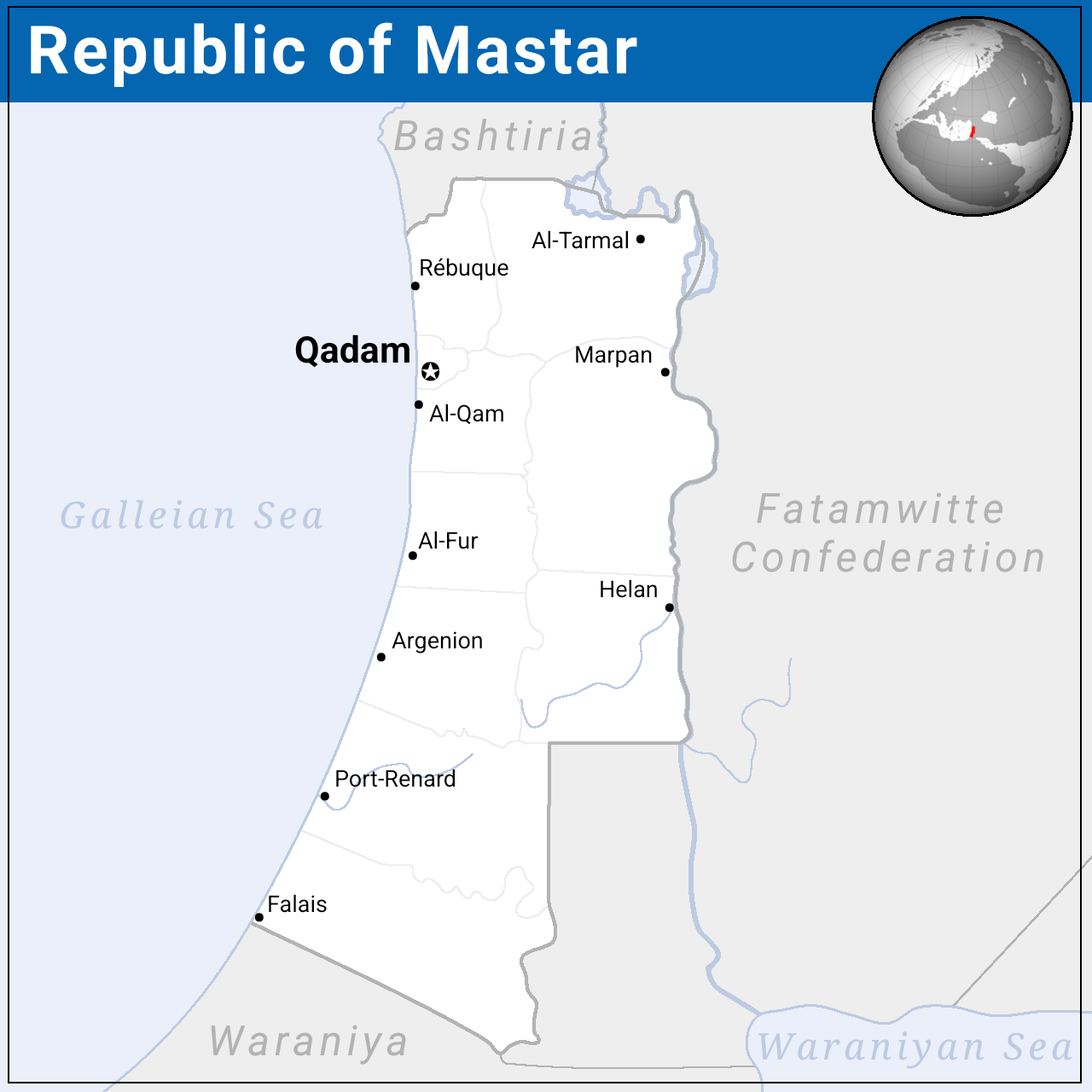
Mastar is a mountainous country located in South-West Aurora. The Mastari Mountains run through the middle of the country and divide it into two distinct climates: a Galleian climate in the west along the coast and a desert climate in the east. The highest mountain in Mastar is Mount Adélard, which peaks at 3,004 meters above sea level (masl). Mastar's territory is approximately 137,278 km², and its land border measures about 1,745 km.
The Sartar River is the longest river in Mastar. It runs along the Mastar-Fatamwitte border. Lake Garman, which is located on the Sartar River, is the largest lake in Mastar, although most of it lies beyond the country's borders. The Mastari coastline measures approximately 627 km.
Economy
Mastar's economy is market-oriented, with the government officially subscribing to the Renish doctrine of Dirigisme. The state plans economic development and then "pushes" the market in desired directions through investments and subsidies for private enterprises in targeted sectors. Mastar's economy is heavily dominated by oil extraction, which has grown consistently since independence in 1955, as well as tourism and its role as a regional banking hub.
Politics
Also read: National Assembly of Mastar.